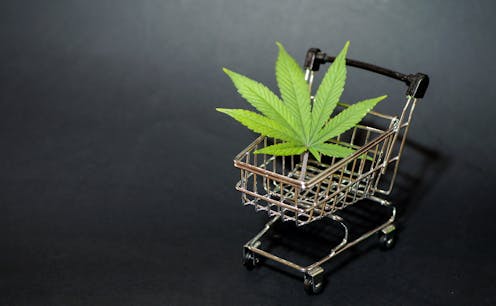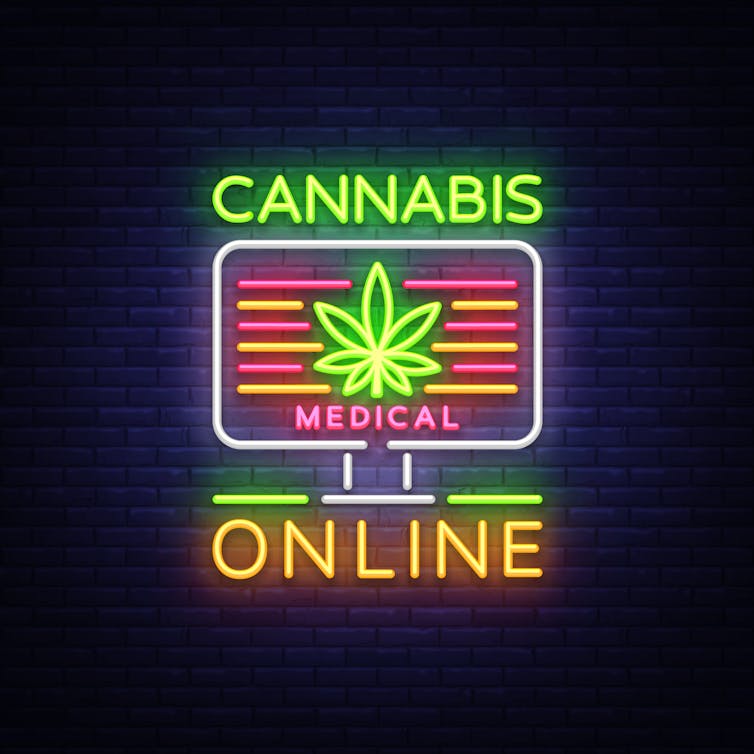
A multi-million dollar business has developed in Australia to meet the demand for medicinal cannabis. Australians spent more than A$400 million on it in the first half of 2024 alone.
More Australians than ever are using medicinal cannabis to treat long-term health conditions, such as chronic pain, anxiety and cancer. Some go to their GP and receive a prescription, which they take to a pharmacy. But many bypass their GP. Instead, they buy it online from private medicinal cannabis clinics after a telehealth appointment with the clinic’s doctor.
However, when we looked at these clinics’ websites, we found many examples of aggressive and misleading marketing. Some clinics breached regulatory guidelines. Others bent the rules.
Our new study shows how common this is and why we’re so concerned about the implications for public safety.
Medicinal cannabis is legal, but costly
Medicinal cannabis has been legally available in Australia since 2016. This means doctors can prescribe it – as a capsule, oil or dried flower, for example – for any medical condition when other approved treatments have not worked.
According to the 2022–23 National Drug Strategy Household Survey, 3% of Australians aged 14 or over had used cannabis for medical purposes in the previous 12 months, equating to around 700,000 people.
The number of prescriptions have also increased ten-fold between 2019 and 2022–23, indicating improved access and greater acceptance of medicinal cannabis in the health-care system.
But most medicinal cannabis products are not officially approved for medical use by the Therapeutic Goods Administration (TGA), Australia’s medicines regulator. These “unapproved” medical products have not been tested for safety, quality or effectiveness.
They’re also not subsidised through the Pharmaceutical Benefits Scheme. This means patients must pay for it themselves.
The cost of medicinal cannabis can range from A$50 to $1,000 for a week’s supply. The exact amount depends on the patient’s medical condition, the dose required and the type of product prescribed.
Medicinal cannabis is heavily marketed
The growth of the industry has been overshadowed by some questionable medical practices by for-profit cannabis medical clinics.
For example, the TGA bans advertising of medicinal cannabis (and any unapproved medicines) to prevent unnecessary public demand and unsafe prescribing.
But in 2023–24, the TGA collectively fined businesses that broke this rule more than A$1.1 million and took legal action for alleged unlawful advertising. Businesses were allegedly promoting cannabis for serious medical conditions or allegedly implying the TGA had approved or endorsed their products.
So we investigated if this had continued by analysing the websites of 54 private medicinal cannabis clinics in Australia.
We searched for clinics in Google using keywords such as “plant medicine” and “green medicine”. We then looked at their websites and checked whether they followed the TGA guidelines.
We examined if their websites made any references to medicinal cannabis, health claims, shared information from other sources about medicinal cannabis, or used patient reviews. These are considered forms of promotion. So including such content on clinic websites would violate TGA guidelines.

Here’s what we found
Our research revealed widespread breaches of TGA guidelines.
The most common was using cannabis images on websites or logos. Clinics also avoided using “medicinal cannabis” in their trade names and instead used terms such as “plant medicine” to comply with the TGA guidelines. Awards from the cannabis industry also appeared on websites.
Another common breach was to make unsubstantiated health claims about the benefits of medicinal cannabis, including that it could treat anxiety, depression, or other mental health symptoms. This mirrored findings of an earlier analysis of tweets about medicinal cannabis.
Websites often allowed people to assess their own eligibility for medicinal cannabis. Self-assessment may mislead people into believing they would benefit from it, inadvertently “coaching” them on which medical conditions might warrant a prescription. Self-assessment might also lead people to believe they require more medicinal cannabis than is medically necessary.
Other marketing tactics we found included:
same-day or after-hours delivery
no GP referrals required
discounted consultation fees
discreet delivery
targeted advertisements on social media.
These practices challenge the intent of the TGA guidelines to ensure responsible prescribing, and push the boundaries of permissible prescribing.
While the TGA has issued million of dollars in fines over recent years and initiated court actions over how medicinal cannabis is marketed, our study suggests such violations continue.
Unsafe prescribing
An ABC media report in 2024 alleges other unsafe prescribing practices.
These included allegations of cannabis clinics repeatedly selling products containing THC (tetrahydrocannabinol) to people diagnosed with psychosis or with mental health conditions. THC can worsen psychotic symptoms, mental health and increase the risk of a relapse.
In one incident, someone with a mental health condition tragically took his life after being prescribed medicinal cannabis. Yet, the clinic reportedly continued to send packages of medicinal cannabis addressed to him, despite requests from his family to stop.
Play by the rules
Medicinal cannabis clinics have undoubtedly improved patient access. However, we need more stringent monitoring and regulation of how these clinics market themselves.
Even if clinics are operating within the law, they also need to operate ethically to protect public health by prioritising patients’ wellbeing over profit.
Using terms such as “plant medicine” instead of “medicinal cannabis”, for instance, may technically comply with regulations but can still mislead people. It also risks weakening public confidence in the health-care system.
Carmen Lim receives funding from the National Medical Health Research Council (2024-2028). She has not received any funding from the alcohol, cannabis, pharmaceutical, tobacco or vaping industries.
Wayne Hall has advised the World Health Organization (WHO) on the health effects of cannabis (2016-2023); reviewed evidence on the medical uses of cannabis for the Australian government (2017-2018); served as a member of the Australian Advisory Council on the Medical Uses of Cannabis (2017-2020); and served as an unpaid Chair of the International Scientific Advisory Board to the NHMRC-funded Centre for Excellence in Clinical Research on Medical Uses of Cannabinoids (2019-2022). He has not received any funding from the alcohol, cannabis, pharmaceutical, tobacco or vaping industries.
This article was originally published on The Conversation. Read the original article.







